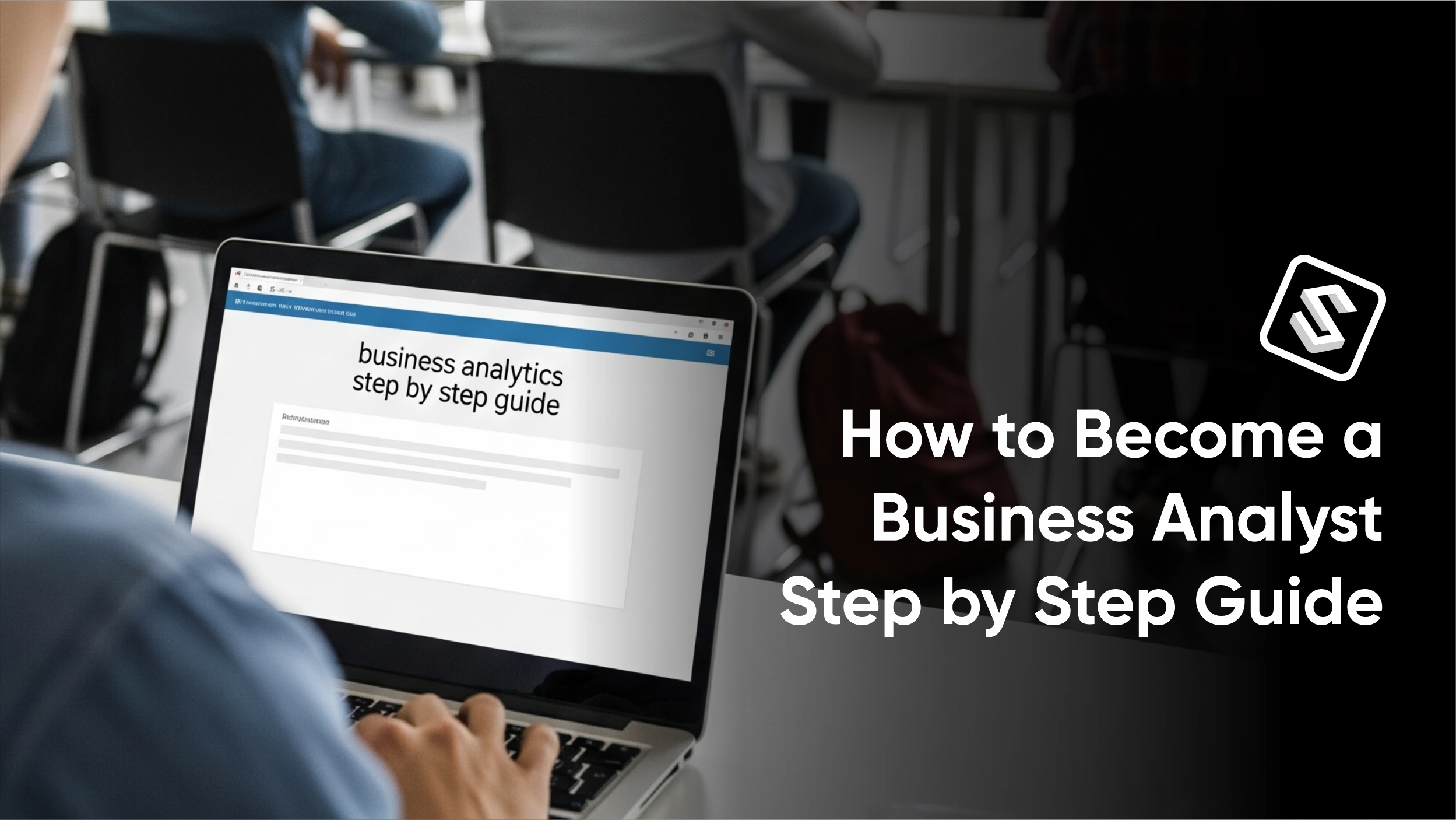
How to Become a Business Analyst – Step by Step Guide
Today's data-driven world requires every business to grow with smart decisions — and that's where a Business Analyst steps in. If you are someone who is passionate about problem-solving, trend analysis, and making companies better, then a Business Analyst role could be ideal for you.
At SkillStackHub, we feel that students and freshers should be equipped with the appropriate training and skills to join such in-demand positions confidently. In this comprehensive guide, you will understand everything about how to become a Business Analyst, step by step — right from the skills you require to the training programs offered at SkillStackHub, and more.
What is a Business Analyst?
A Business Analyst (BA) is a technical expert who serves as a link between business issues and technical solutions. They examine processes, gather and analyze data, and assist businesses in making sound decisions. Their primary function is to facilitate aligning the company's business and IT teams to produce successful projects.
Business Analysts are employed in industries — finance, IT, healthcare, retail, marketing, etc. Whether customer experience needs enhancement, costs have to be trimmed, or a new product has to be launched, a Business Analyst is an integral part of strategy and implementation.
Why Business Analysis as a Profession?
High Demand: As businesses increasingly digitize, the demand for experts who can speak business and technology continues to increase.
- Good Salary: The salary of a Business Analyst in India varies between ₹6 and ₹12 lakhs per annum depending on experience.
- Growth Opportunities: You can switch to positions such as Product Manager, Project Manager, Data Analyst, or Business Consultant.
- Work Variety: From analyzing the trend in sales to tracing user journeys, each day is different.
Step-by-Step Guide to Become a Business Analyst
Let us now discuss steps that will assist you in establishing a successful career as a Business Analyst:
Step 1: Knowing the Job
Understand what a Business Analyst does on a day-to-day basis. Go through job postings, study case studies, and learn from video interviews. At SkillStackHub, we provide actual case studies in our courses to provide you with an idea of day-to-day work.
Key Responsibilities:
- Collecting business requirements from stakeholders
- Recording processes and workflows
- Performing gap analysis
- Developing business models and reports
- IT-business coordination
Step 2: Acquire the Proper Educational Background
There is no set degree, but Business Analysts typically have a background in:
- Business Administration
- Commerce
- Information Technology or Computer Science
- Economics or Finance
Graduates in any stream can join this profession, particularly if they possess analytical skills. You don't require a Master's degree to begin with — certification and training programs can provide you with the necessary edge.
Step 3: Learn Essential Business Analyst Skills
To succeed as a Business Analyst, you’ll need a combination of technical and soft skills. SkillStackHub focuses on all these skill sets in its training modules:
Technical Skills:
- MS Excel (for data analysis)
- SQL (for querying databases)
- Tableau/Power BI (for data visualization)
- UML and BPMN (for process modeling)
- Agile & Scrum methodology
- Basic knowledge of programming (optional but helpful)
Soft Skills:
- Analytical thinking
- Communication skills
- Problem-solving ability
- Attention to detail
- Negotiation and collaboration
Step 4: Enroll in a Professional Course or Certification
If you're a fresher or changing careers, taking a Business Analyst course will speed up your learning process. SkillStackHub provides a practical Business Analyst course that caters to beginners and working professionals alike.
Search for certifications such as:
- CBAP (Certified Business Analysis Professional)
- CCBA (Certification of Competency in Business Analysis)
- ECBA (Entry Certificate in Business Analysis)
SkillStackHub's Certified Business Analyst Program
These certifications certify your talent and enhance your credibility during job interviews.
Step 5: Develop Real-Time Projects
Theory is one thing, but putting it to practice for real-world situations is what turns you job-ready. In SkillStackHub, students get to work on live projects, industry case studies, and simulations.
If you're not taking a course, attempt freelance work or internships. Even minor projects such as social media engagement analysis or website traffic can contribute to your portfolio.
Step 6: Create a Solid Resume and LinkedIn Profile
Emphasize your skills, projects, certifications, and accomplishments. Use action verbs and where possible, quantify your outcomes. Example:
"Enhanced customer satisfaction rates by 20% by optimizing customer support processes."
Your LinkedIn too should depict the same details, with extra keywords such as Business Analyst, data analysis, requirements gathering, etc., to catch the attention of recruiters.
Step 7: Prepare for the Interview
Business Analyst interviews assess technical skills and problem-solving capacity. Prepare for:
- Case study-based questions
- Tools-based questions (Excel, SQL, Power BI)
- Scenario-based problem-solving
- Behavioral and HR questions
Practice mock interviews with friends or mentors. Interview preparation assistance with real-time questions and feedback is available on several platforms, including SkillStackHub.
Step 8: Apply for Entry-Level Positions
Begin applying for:
- Junior Business Analyst
- Business Analyst Intern
- Data Analyst (with business orientation)
- Associate Analyst
You might not find your ideal job right away, but 1–2 years of experience in analysis or operations positions can propel you upward faster.
Step 9: Continue Learning and Upgrading Skills
The business world keeps changing — stay ahead by continuously learning. Follow Business Analyst communities, attend webinars, and explore new tools. SkillStackHub offers lifelong access to course materials and webinars to keep your knowledge fresh.
You can also specialize in:
- Financial analysis
- Product analysis
- Marketing or sales data analysis
- Agile project management
Becoming a Business Analyst is not just a good career choice but also an exciting one. It enables you to merge logic, communication, and technology to create tangible business impact. Whether you are a student, fresher, or a working professional seeking a changeover, you can begin today with the correct steps.
And don't forget, you're not single-handedly undertaking this challenge. Sites like SkillStackHub exist to mentor, guide, and tutor you throughout each step — from understanding the fundamentals to acing job interviews. With proper guidance and training, your career as a Business Analyst is just one step away!




